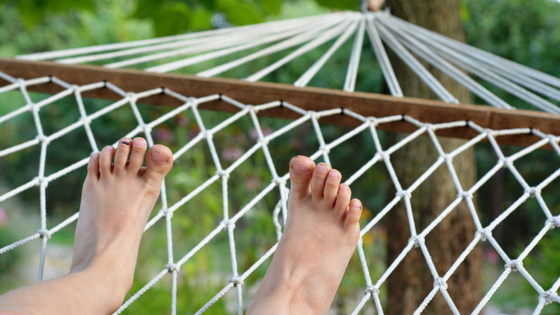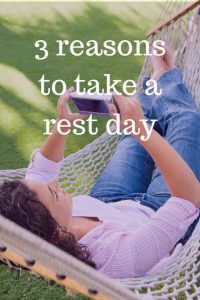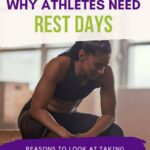Updated Feb. 7, 2023

Why Rest Days Are Important And How to Know If You Need One
When was the last time you took a rest day or rest DAYS away from your workouts or your regular routine in another way?
Like the kind where you literally did NOTHING, and you planned it that way.
If your answer is “Uhhh, I don’t remember my last rest day,” or “training breaks are for wusses,” this is your invitation to rethink that.
Why Rest Is Important
Thousands of people purchased rowing machines during the pandemic. Looking at the rowing-related Facebook groups, A LOT of them decided to go hard into rowing just as soon as they got that baby out of the box.
I get it! Rowing is a fun, total-body, non-impact workout that lets YOU decide how hard or easy it is. Awesome indeed, but too much of a good thing is still too much.
I learned that in spades the last time I rowed a million meters in one month for the Concept2 World Erg Challenge. I hit my goal, but it took me 4ish hours of rowing Every. Single. Day. to get there.
By the end I was exhausted, hurting all over, and kind of hating the erg. I was wildly overtrained. Not a good place to be.
Listen. I’m all about getting a great workout in. Give me something that gets my heart rate up and the sweat rolling and I’m a happy girl.
But our bodies weren’t made to go, go, go all the time.
Often you make more progress if you slow down and take it easy, at least a day or two a week.
If you need more reasons to look at taking the pedal off the gas and give yourself a rest day – or two or six – here you go:
3 Reasons to Take a Rest Day
1. Rest Is Essential to Fitness Progress
1. As we say about training, “You progress in the rest.” The workout is the stimulus for change, but the recovery IS the change. That’s when the muscles are resting and growing after being stressed.
You see, workouts create tiny tears in your muscle fibers. It’s during the rest period that they repair themselves and actually grow stronger.
Something to keep in mind: The general rule is you need at least 24-48 hours to recover from a workout.
The older we get, the longer the recovery time.
So don’t feel like you “should” be working out as much as possible. In fact, it may very well be
the opposite.
2. Improved performance in your workouts
Rest helps you keep your mental and physical edge: A little time off from the rowing machine will do wonders for your performance when you do get back to it.
Think about what happens when you have a long push at work or at home. The more tired you get, the less effective you are.
Eventually, you realize that something that took you only a short time when you were fresh is taking way longer, and you may not be doing it as well no matter how hard you try.
It’s the same with your workouts. If all you ever do is push, your splits will eventually fall off or you’ll notice you’re not making progress the way you used to.
By the way, “a little time off” doesn’t have to mean a rest day or two a week.
If your mental or physical performance is really suffering and you’re showing signs of overtraining, you may need to take a longer break.
Unless you’re training for something right now (and even if you are) we promise the world won’t come to an end if your planned weight or erg session becomes a fun day at the pool, an easy-breezy walk or bike ride, or an afternoon in a comfy chair with a good book.
You’d have to do absolutely nothing for two weeks or more before you’d really feel the effects of any deconditioning. So kick back, relax, and restore.
3. Reduce the Risk of Injury
By resting you prevent overuse of your muscles, and that in turn prevents injury.
Rowing is inherently safe and low-impact, but it is also a repetitive motion. So taking a break every once in a while just makes sense to be sure nothing is aggravated.
[Want help with your rowing technique? Check out our RowNow and RowReady programs for beginners and more advanced rowers!]
Want to lose ground? Tear a rotator cuff or pop your Achilles. Then you’ll REALLY be resting.
We worship “the grind” in the United States, often to our detriment.
If all you’re doing is going, going, going, whether in your workouts, your work, or some other aspect of your life, you will eventually break down. Bet money on it.
How many rest days a week should I take?
The right answer will vary from person to person, but the general consensus is 1-2 for most people.
One of those can be “active rest” where you’re just getting out and moving for fun. One day of complete rest can be a performance and recovery game changer and is HIGHLY recommended.
If you’re not sleeping as well as you’d like, try resting MORE. While exercise can be great for sleep, you may have gathered at this point that too much of a good thing is still too much.
Exercise stimulates our stress hormones, so if the body doesn’t have sufficient time to recover that can show up in disrupted sleep.
How to make the most of your rest days

2. BUMP UP THE PROTEIN – It’ll help you rebuild that muscle you damaged in your workout.
3. HYDRATE, HYDRATE, HYDRATE – We need hydration ALL the time, not just when we’re working out or being active. Don’t worry about some scientific calculation of how much to drink. If you’re peeing clear, you’re good.
4. MOVE IF YOU MUST, BUT GENTLY – If spending the day on the couch is more than you can manage, limit yourself to gentle movement that doesn’t get your heart rate up. Think a stroll or VERY light row or bike ride. If you’re sore and need some active recovery, 30 minutes-ish or so should be plenty.
So consider this your hall pass to go find a hammock or a cozy couch and a big old glass of tea or lemonade. We’ll see you there!
Questions? Thoughts? Hit us up in the comments, we’ll get back to you asap … probably from the couch.
Want more ideas like this? Subscribe to our newsletter, we send out fresh workouts, technique tips and thoughts to row by every week!



Thank you, Sarah! I rarely, rarely take a day off – I feel better when I get the work out done. This article does give me ideas for getting the work done in a new, & perhaps, even refreshing way though…
Hi Ann! So glad you liked it, please feel free to share any tips that work for you, too! And PS: Congratulations on becoming a Certified Indoor Rowing Instructor! 🙂
am 2 weeks away from the British Rowing Indoor Championships, and the training is getting hard as well as feeling like taking a rest day is a waste of a days training, however reading your article has made me realise I am fatigued and I need to take a day of rest to allow my body to recover a bit before hitting my final hard week and then tapering for what I hope will be a sub 6:40.00!! Thank you!! x
So glad you liked it, David! Absolutely take some rest in there. And I hope your training plan includes tapering the week of the event. You can’t PR if you’re injured or exhausted. Keep us in the loop!
Hi! Everybody! I row every other day! The days I don’t row I like to jog! I’m 70 and feel great! I also like to like to use free weights up to 20lbs!
Hi Ken, I hope you also take a rest day every once in a while!
I just got back into my rowing machine routine (1st week after a 8 month break) and it has done wonders for both my mental and physical health! Forgot how fantastic I feel for the whole day after my morning HIIT rows…..I know rest days are needed but I am afraid that if I take a day off it’ll turn to 2 then 3….. I live by the motto – rowers get more done by 8am than most!
Any suggestions to not feel guilty if I take a day off? Also, on rest days should I augment my protein intake or keep the same? Calories too?
My goal is gain muscle mass (at 114.4 now w BMI of 19% 151 lbs and 5’7″) tone (every woman’s goal) and maintain that runner’s high which I get w my erg…..